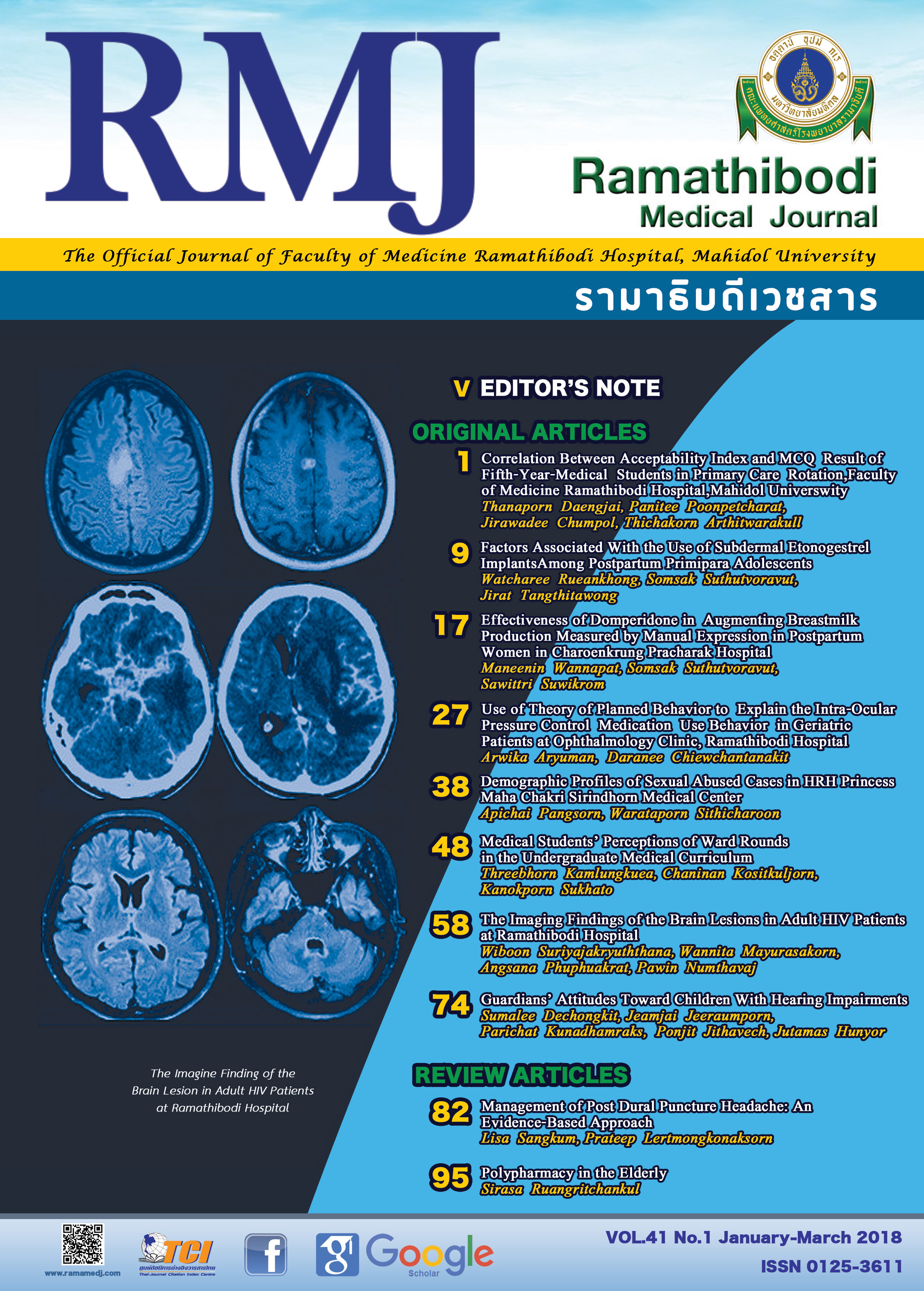Demographic Profiles of Sexual Abused Cases in HRH Princess Maha Chakri Sirindhorn Medical Center
DOI:
https://doi.org/10.14456/rmj.2018.5Keywords:
Sexual assault, Rape, Forensic medicineAbstract
Backgrounds: Incidence of sexual assault and rape are increasing. Majority of the abused cases occurs in young children. Analysis of patients’ characteristics is necessary for prevention.
Objectives: Examined characteristic data about sexual abused cases, assailants and events for prevention.
Methods: Retrospective analysis of recorded data of patients whom were sexually abused during 2006 and 2016.
Results: Most of the victims were aged between 11 and 15 years old (66.5%). Majorities of them were secondary school students (52.3%), singles (94.5%) and had already been sexually active (46.2%). 61.5% of the sexually active group had never used any kind of contraception. Half of the assaults occurred at the assailant’s places (47.2%) and the most of assailants were their boyfriends (60.4%). Condom was not used in 71.1% of cases. The genital examination revealed old tear of the hymen in 53.8%. New tear was observed in 24.9% and 2.5% had no genital injury. The incidence of pregnancy was 11.2% while HIV and syphilis infection rates were 1.0% and 0.5%, respectively.
Conclusions: Most of the abused cases were children and adolescent and had already been sexually active. Early treatment of the victims may reduce the sequalae, both prevention of pregnancy and sexually transmitted diseases.
References
Rogers DJ. Chapter 13: Adult sexual offences. In: Clinical forensic medicine. McLay WDS. Clinical forensic medicine. Cambridge University Press; 2009:137-154.
Jewkes R, Abrahams N. The epidemiology of rape and sexual coercion in South Africa: an overview. Social science & medicine. 2002;55(7):1231-1244.
Daru PH, Osagie EO, Pam IC, Mutihir JT, Silas OA, Ekwempu CC. Analysis of cases of rape as seen at the Jos University Teaching Hospital, Jos, North Central Nigeria. Nigerian journal of clinical practice. 2011;14(1):47-51.
Muehlenhard CL, Linton MA. Date rape and sexual aggression in dating situations: Incidence and risk factors. Journal of counseling psychology. 1987;34(2):186-196.
Thai Criminal Code. http://web.krisdika.go.th/data/law/law4/%BB06/%BB06-20-9999-update.pdf. Accessed 23 AUG, 2017.
Nuchanach Hinwised ST. Effects of Empowerment Program on Perceptions of Date Rape Prevention in Early Adolescence with Risk Factors. Journal of Nursing Science & Health 2013;36(4):45-56.
Borkar R, Bashir M, Meshram S, Madhusudan S. Medico-legal and socio-demographic profile of rape cases in district hospital, Adilabad (Andhra Pradesh). Indian Journal of Forensic Medicine Toxicology. 2010;4(1):45-47.
Hassan M, Awosan KJ, Panti AA, et al. Prevalence and pattern of sexual assault in Usmanu Danfodiyo University Teaching Hospital, Sokoto, Nigeria. The Pan African medical journal. 2016;24:332.
Manzoor I, Hashmi NR, Mukhtar F. Medico-legal aspects of alleged rape victims in Lahore. Journal of the College of Physicians and Surgeons--Pakistan : JCPSP. 2010;20(12):785-789.
Puttikankit T. Community Context under the Semi-Urban, Semi-Rural Society. FEU Academic Review. 2015;9(1):7.
Quader MM, Rahman MH, Kamal M, Ahmed AU, Saha SK. Demography and findings of reported rape cases. Mymensingh medical journal : MMJ. 2010;19(1):32-36.
Ezechi OC, Adesolamusa Z, David AN, et al. Trends and patterns of sexual assaults in Lagos south-western Nigeria. The Pan African medical journal. 2016;24:261.
Hagemann CT, Helland A, Spigset O, Espnes KA, Ormstad K, Schei B. Ethanol and drug findings in women consulting a Sexual Assault Center--associations with clinical characteristics and suspicions of drug-facilitated sexual assault. Journal of forensic and legal medicine. 2013;20(6):777-784.
O'Neal EN, Decker SH, Spohn C, Tellis K. Condom use during sexual assault. Journal of forensic and legal medicine. 2013;20(6):605-609.
Astrup BS, Ravn P, Thomsen JL, Lauritsen J. Patterned genital injury in cases of rape – A case–control study. Journal of forensic and legal medicine. 2013;20(5):525-529.
Zilkens RR, Smith DA, Phillips MA, Mukhtar SA, Semmens JB, Kelly MC. Genital and anal injuries: A cross-sectional Australian study of 1266 women alleging recent sexual assault. Forensic Science International. 2017;275:195-202.
Holmes MM, Resnick HS, Kilpatrick DG, Best CL. Rape-related pregnancy: Estimates and descriptive characteristics from a national sample of women. American Journal of Obstetrics and Gynecology. 1996;175(2):320-325.
Geounuppakul M, Ruengkris T, Ubolsawat P. Unplanned teenage pregnancy: Reasons for not having an aborting. JOURNAL OF HEALTH SCIENCE RESEARCH 2013;7(1).
Jenny C, Hooton TM, Bowers A, et al. Sexually Transmitted Diseases in Victims of Rape. New England Journal of Medicine. 1990;322(11):713-716.
Meel B, Kwizera E. Prevalence of HIV in the Mthatha area of South Africa, as estimated from the testing of rape victims. Medicine, science, and the law. 2011;51(2):106-108.
Marfatia YS, Jose SK, Baxi RR, Shah RJ. Pre- and post-sexual exposure prophylaxis of HIV: An update. Indian journal of sexually transmitted diseases. 2017;38(1):1-9.
Muriuki EM, Kimani J, Machuki Z, Kiarie J, Roxby AC. Sexual Assault and HIV Postexposure Prophylaxis at an Urban African Hospital. AIDS patient care and STDs. 2017;31(6):255-260.
Downloads
Published
How to Cite
Issue
Section
License
Copyright (c) 2018 Ramathibodi Medical Journal

This work is licensed under a Creative Commons Attribution 4.0 International License.

















